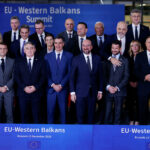- A new local election will be held in Belgrade
Speaker of the Serbian Parliament, Ana Brnabić, has scheduled local elections in Belgrade for June 2.
As you know, the “Serbia against violence” opposition coalition, after the parliamentary and local elections on December 17 last year, accused the authorities of electoral manipulation. International observers also reported violations at the elections.
However, another reason for new elections in the capital of Serbia is that the local assembly could not start its work because a majority was not formed.
The election is considered as a compromise decision made by the Serbian authorities against the allegations of violations. Both the international community and the opposition accepted this decision.
- Serbia will oppose Kosovo’s joining the Council of Europe
At an extraordinary meeting of the government, Serbian President Aleksandar Vučić has requested the formation of a special team for “fight for Serbia” regarding the initiative for Kosovo’s accession to the Council of Europe. This issue will be discussed at the session of the Parliamentary Assembly of the Council of Europe on April 16, and the Committee of Ministers of the Council of Europe should make a final decision on May 16-17.
Vučić emphasized that government officials should focus on preventing Priština from being accepted into the Council of Europe.
The extraordinary meeting of the government consisted of both an open and a closed part. The meeting was attended by Speaker of Parliament Ana Brnabić, ministers and representatives of the security forces, army and police, as well as directors of state-owned companies.
Serbian Foreign Minister Ivica Dačić, the de facto head of the Serbian government, said on April 5 that the government had formed a team to oppose Priština’s application for membership in the Council of Europe. He and the Director of the Office for Kosovo and Metohija, Petar Petković, will be co-chairs, Dačić added. Most of the team will consist of employees of the Ministry of Foreign Affairs, the Parliament and the Presidential Office, as well as the ministers of European integration, domestic and foreign trade.
The details of Belgrade’s plan to oppose Kosovo’s accession to the Council of Europe are not made public. Currently, it is known that, in addition to political arguments, the Serbian government is going to put pressure on the member states of the Council of Europe by demonstrating the economic consequences of deteriorating relations with Serbia.
- Serbs boycott the census in Kosovo
In Kosovo, the population, household economies and dwellings registration (ReKos2024) has started, which will last from April 5 until May 17 this year.
For the first time the census will cover “economic damage, amount of property destroyed, and family members killed, missing, wounded or imprisoned” during the war, from February 28, 1998, to June 12, 1999. According to the Statistics Agency of Kosovo, data on “war damage” are needed both for negotiations with Serbia and for future membership in the European Union.
The registration was also planned to be carried out in the municipalities in the north of Kosovo, where Serbian population mostly prevail, namely Leposavić, Zubin Potok, Zvečan, and North Mitrovica. However, Serbian parties in Kosovo opposed the participation of Serbs in the census.
The largest party of Kosovo’s Serbs, the Serb List, stressed that by the census, the Priština government “wants to confirm its shameful success in expelling the Serbs.” Albin Kurti wants to use the registration to further attack Serbia with war reparations, further discouraging every Serb from participating in the process, the statement said.
The Serbian population in northern Kosovo shows little readiness for the census, and that only 64 citizens of Serbian nationality have been registered since the start of the process, the Acting Executive Director of the Kosovo Statistics Agency, Avni Kastrati, said on April 8.
The situation around the census has become a topic of disagreement between the Kosovo authorities and the local Serbs. Data on the number of Serbian population obtained will not reflect reality, thus, Priština will not be able to use them, for example, to argue against the creation of the Association of Serbian Municipalities. However, the data on losses from the war will most likely form the basis of Kosovo’s probable claims to Serbia.
- The European military mission in BiH (EUFOR) will conduct training
250 troops of EUFOR Althea, the EU Strategic Reserve Force, will arrive in Bosnia and Herzegovina in the coming days for exercises. This was announced by the commander of the EU forces in BiH, General Laszlo Sticz (Hungary).
These are previously planned measures aimed at preserving a stable environment in Bosnia and Herzegovina, he stressed.
General Sticz noted that the military from France would arrive first next week. They would stay in BiH for a month. Later, the French soldiers would be joined by soldiers from Italy and Romania.
Additional troops will join EUFOR forces in Bosnia and Herzegovina for the strategic integration of reserve forces in case of any military intervention.
In addition, it is planned to carry out joint exercises of EUFOR and the armed forces of Bosnia and Herzegovina, which help to increase their cooperation and interoperability.
Although the EUFOR exercises are considered as a planned one, increasing the presence of the European continent will demonstrate the readiness of the EU to give a strong response to possible threat and instability of Bosnia and Herzegovina.
- Bosnians ask NATO to begin the integration of BiH into the Alliance
“Bosnia and Herzegovina is now at NATO’s door,” said Denis Bećirović, a member of the Presidency of Bosnia and Herzegovina from Bosnia and Herzegovina, during a meeting with NATO Secretary General Jens Stoltenberg. “NATO membership is one of Bosnia and Herzegovina’s strategic foreign policy priorities. That is what BiH state institutions have decided, and that decision was made in such a way that representatives from both entities and all of BiH peoples voted for it. That is why we have a very clear legal framework, with BiH institutions having adopted all the necessary legal and strategic documents for the defense sector,” Bećirović said at a joint press conference on April 8. “All formal requirements for BiH’s application for NATO membership have been fulfilled,” he added.
However, the leaders of the Bosnian Serbs disagree with this position. At the end of March, the President of the Republika Srpska, Milorad Dodik, stated that, according to the procedure, the Parliamentary Assembly of BiH should give consent to join NATO, but, according to him, such consent did not exist and would not. “Together with Serbia, we remain militarily neutral. BiH is not a candidate country for NATO membership and will not be a NATO member,” Dodik stressed.
Thus, joining NATO is not an issue agreed in BiH, and it will not be possible to do in the near future.
- Orbán is awarded with the Order of the Republic of Srpska
On the occasion of the Republic Day, the President of the Republika Srpska Milorad Dodik presented the Prime Minister of Hungary Viktor Orbán with the Order of the Republika Srpska on a necklace.
Viktor Orbán’s role in the development of friendship between Republika Srpska and Hungary is invaluable, Milorad Dodik said during the ceremony, “and we want to continue and deepen it,” he added.
“I have always supported the Serbs, because I am convinced that the international policy is unfair to them,” Orbán stressed, in turn.
The Order of the Republika Srpska on a necklace is the highest decoration of the Republika Srpska. Last year, Vladimir Putin received this award.
Receiving the Order, Orbán once again demonstrated solidarity with the Serbian regional politicians with pro-Russian views. Considering the future presidency of Hungary in the EU, we should expect support for Belgrade not only from Budapest, but also from Brussels, and Banja Luka. This means the blocking of possible sanctions against the leaders of the Bosnian Serbs, the de-actualization of the need for Serbia to introduce sanctions against Russia, etc.
- North Macedonia buys 8 helicopters for the army
The Italian Leonardo has signed an agreement to supply four AW149 and four AW169M helicopters to the army of North Macedonia.
According to the country’s Defense Ministry, seven helicopters will be used for transport, firefighting and rescue missions, and one – as a medical transporter with special equipment.
“With the purchase of the new helicopters, there will be a significant modernization of the aviation component and an increase in the capabilities to perform missions both for the needs of the Army and for the support of other civil institutions of our country,” said Defense Minister Slavyanka Petrovska.
The helicopters are expected to arrive between the second half of 2026 and the end of 2028.
The purchase of new helicopters is part of a plan to modernize the armed forces of North Macedonia, which recently became a NATO member. However, any fact of the purchase of a large batch of military equipment in the region of the Western Balkans is also considered as the general militarization of the region.



